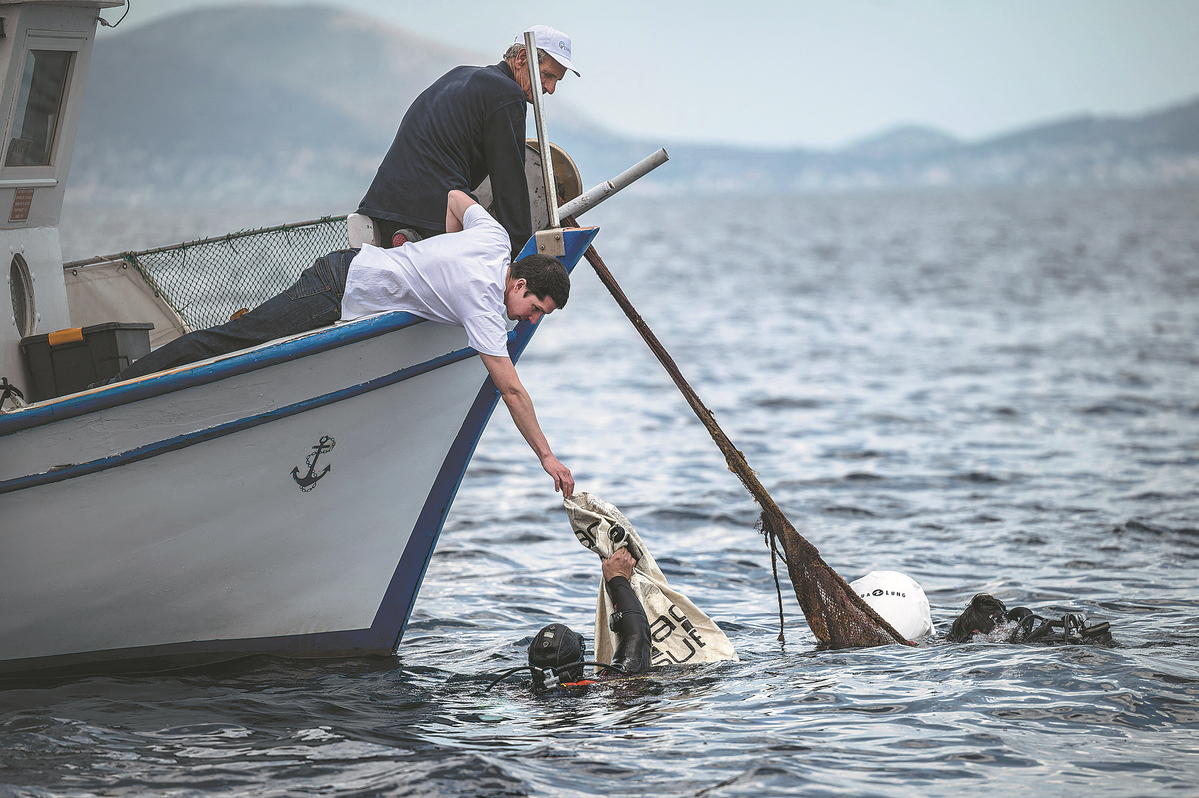'Swimming in plastic': Greek fishermen clean up seabed litter
China Daily | Updated: 2023-06-03 07:17

KERATSINI, Greece — In the west of the Greek capital Athens, the fish market of Keratsini is abuzz early in the morning, with trawlers disgorging crates of sardines and anchovies as trucks await nearby to be loaded.
But on his family's fishing boat, Lefteris Arapakis sorts out a different sort of haul — bottles, boots, plastic pipes and fishing nets, all dragged from the bed of the Aegean Sea.
"We are swimming in plastic," said Arapakis, whose family has fished for five generations.
By 2050, "there will be more plastic than fish" in the sea, he said, quoting recent reports.
That morning's plastic catch weighed "about 100 kilograms", said the 29-year-old economist and co-founder of Enaleia, a nonprofit that encourages fishermen to collect marine litter caught in their nets.
Since its establishment in 2018, it has worked with more than 1,200 fishermen in Greece to raise awareness over the degradation of the maritime environment.
The seabed litter does not come only from Greece, but from all over the Mediterranean, moving with the sea currents.
Active in 42 ports throughout Greece, Enaleia provides fishermen with large bags for marine waste that they can deposit in dumpsters once back at port.
For every kilogram of plastic they deliver, they receive a small "symbolic" sum. The money is enough for a drink, said Arapakis, who was in Paris this week for global talks on limiting plastic pollution.
Representatives of 175 nations met at the UNESCO headquarters with the aim of making progress toward reaching an agreement by next year covering the entire plastics life cycle.
Fancy transformation
Since October, fishing crews affiliated with Enaleia have dragged out 20 metric tons of plastic and old fishing equipment each month. Nearly 600 tons have been collected over the last five years, it said.
The collected plastic is transported to a recycling plant in the industrial area of Megara near Keratsini, to be turned into pellets to make new products such as socks, swimwear or furniture.
One-sixth is fishing nets. Next in line are high — and low-density plastics at 12.5 percent and 8 percent respectively.
But nearly half of the total, 44 percent, is nonrecyclable plastic.
Recycling marine waste is a "challenge" because the plastic is degraded by its exposure underwater, said Hana Pertot, sales manager of the Skyplast recycling plant in Megara.
Arapakis said he embarked on the Mediterranean Cleanup project after a trip to Greece's Cyclades islands, where he saw fishermen throwing the waste gathered by their nets back into the sea.
He is convinced there has been a "mentality change" among Greece's fishermen.
Previously, "we caught large quantities of plastic, but we only kept the fish. All waste was thrown into the sea", said Mokhtar Mokharam, team leader on the Arapakis family's boat.
There are also practical benefits for fishing boats.
"In the past, the anchor often snagged on waste of all kinds, especially nets, and the engine would go out," said Nikolaos Mentis, who works out of Salamina island opposite Keratsini, and has been an Enaleia contributor for the past five years.
Agencies Via Xinhua
























